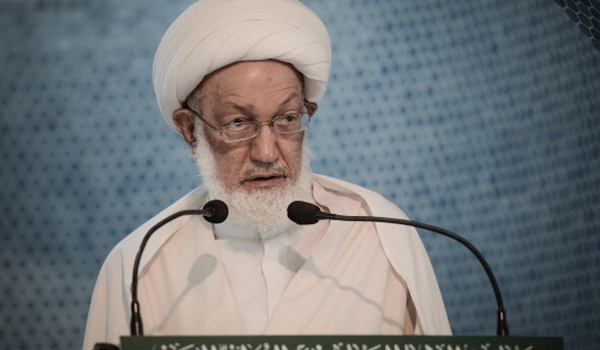
RNA - General Soleimani, who leads the Iranian military advisors in both Iraq and Syria, warned the Manama regime on June 20 to stay away from Bahraini Shiite cleric Ayatollah Sheikh Issa Qassim or wait for dire repercussions, including armed struggle by people and overthrow of the Al Khalifa dynasty.
General Soleimani further warned the Manama regime that in case of any insult or disrespect for Sheikh Qassim, "the toppling of the regime will only be a small part of the repercussions that will also include armed resistance".
The warning came after Bahrain's Interior Ministry announced in an statement that the country's top Shiite cleric was stripped of his citizenship.
As is, Bahrain is a place where peacefully calling for the country to become a republic will get you life in prison. Free expression is prohibited. Regime critics face arbitrary arrests, detention and torture, followed by rubber-stamp convictions and imprisonment under harsh conditions. Guilt is automatic for anyone charged. So are torture and other forms of abuse. That said, the current situation cannot hold forever:
1- The human rights situation in Bahrain remains an issue of serious concern to the international civil society. True, Sheikh Qassim has been publicly criticising the Al Khalifas regime. Yet he has never called for violence. Still, the regime went ahead with no evidence to accuse him of extremism and revoke his citizenship.
2- Despite continuing efforts at peaceful reform, the ruling family’s hold on the judicial process has increasingly taken a turn for the worse, with no end in sight for the prosecution of high-profile critics, a curtailing of the right to any meaningful form of protest or assembly, and an escalating human rights abuse record, which includes rampant, unabated torture.
3- The regime's despotism resists democratic change, cracking down viciously on political opponents, human rights activists, independent journalists, academic freedom, and even medical professionals treating nonviolent protesters brutalized by the security forces. Here, the West is not totally blameless. The abusive regime is but an extension of American-British-Saudi will in the region, and as such its anti-democracy campaign has been but an expression of their Colonial-Wahhabi legacy.
4- The regime has many "friends", among them the world’s loudest human rights advocates: The US and the UK. These "friends" put politics before rights, refuse to address the regime's refusal to take serious steps to hold security forces accountable for abuse, or to call openly for the release of high-profile political prisoners. Despite the outcry, these "friends" also stand by the autocratic regime, labour to defeat the opposition, and cooperate when interests intersect.
5- For the sake of political correctness and geopolitical interests, human rights violations and imprisonments in Bahrain seldom make the mainstream media headlines in the West. The latest being the revoking of Sheikh Qassim's citizenship.
6- Despite the outrage, the regime is unlikely to face rebuke from the United Nations. The US and UK have established military bases in Bahrain, transforming it into a main base for regional military presence and aggression. It’s a reward to the silence they provide on the regime's human rights abuses.
Taken in total, the revoking of citizenship of Sheikh Qassim and other political prisoners further stains the Al Khalifah regime's troubling human rights record. Despite the "political reforms" claims made by the US and British governments, something is seriously amiss in the country. The regime's practices continue unaccountably while Washington and other rogue Western regimes turn a blind eye.
As maintained in numerous reports by the Human Rights Watch and the International Federation of Human Rights, there is no evidence to suggest the regime has ever made any progress in implementing political reforms. There is also no evidence to suggest the regime will ever change course, a change that involves its citizens in its politics and opens up space and possibilities in accordance with international norms.
Under these circumstances, General Soleimani is right to say the long-suffering people of Bahrain have every right to press ahead with their peaceful drive, even armed struggle, to regain their democratic rights and realise their lawful demands.
R۱۱۱/۱۰۸/C/